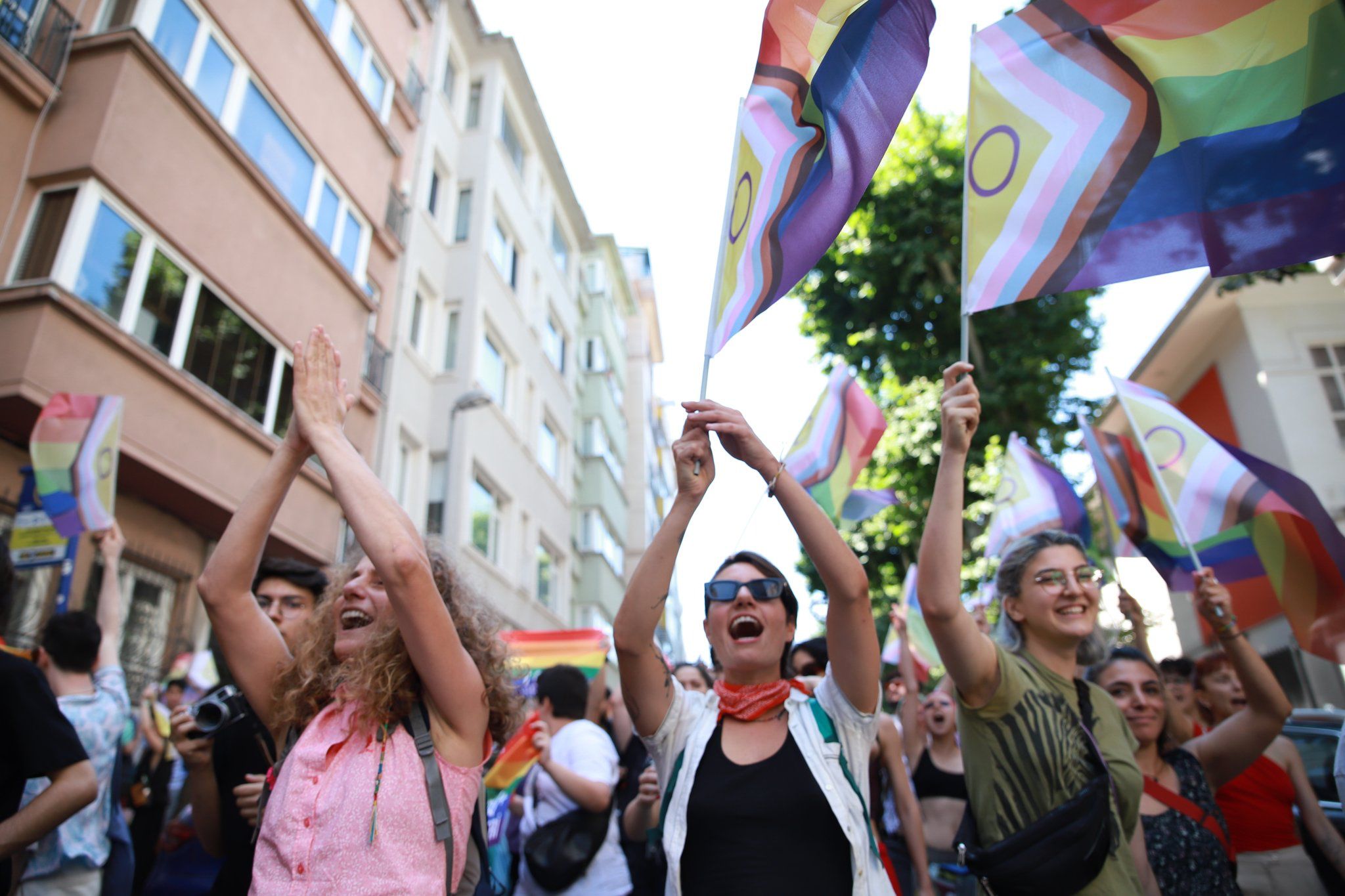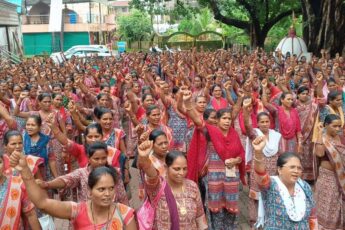
by LALE TERS (TURKEY)
After the presidential election process whose legitimacy is still highly questionable, Erdoğan announced his victory and Turkey enters a new era of ruptures in an undergoing economic and political crisis.
The main propaganda of government’s party (AKP) during presidential and parliamentary election rally was to target, demonize, vilify and threaten women, LGBTQs and Kurdish people in Turkey. By using states funds all at Erdoğans disposition, constant censor policies to media organs including the projection of a fake video during a rally, assembled from different CHP and PKK videos to proof the collaboration between the former, i.e., the main opposition party, and the latter, i.e., the guerrilla movement, AKP managed to apply a perception operation and put forward a hostile and discriminatory understanding infiltrated in religious and patriotic discourses. On the one side, “there are those who love their country, are faithful to Islamic family value”. On the other side, there is the rest, i.e., “those who are treacherous atheist and perverts allying with terrorists and spreading sodomy”. Not only this propaganda on AKP’s side resulted to be effective in the conclusion of the elections, but also made invisible the opinion of almost half of the population who has dissident thoughts toward the 23 years of Erdogan’s dictatorship. Those who are defiant, are under constant threat of deprivation of basic human rights.
While young Ysp (Party of Greens and the Left Future), with their determined upright stance in the participation rate played an important role in the election results proving a true democratic resistance against Erdogan’s false accusations, the AKP made a pivotal alliance that might give the idea that Erdoğan is leaving his so called “resolution process” policy, with two extreme Islamist parties: Yeniden Refah Partisi and Hüda-Par. The alliance with Hüda-Par which managed to have 4 representatives in the parliament, is crucial for the understanding of how Erdogan uses religion as a political tool against Kurdish Sunni people to neutralize Kurdish freedom struggle because even if Hüda-Par advocates a series of things that are considered as “terrorism” by the Turkish State such as removal of phrases about ethnical “Turkishness” from the constitution, oath of parliament; requests of autonomy, federal governance, recognition of Kurdish as mother tongue and education in Kurdish. However, unlike HDP and YSP, its “separatist” agenda does not seem to create a problem since Hüda-Par’s patriarchal and violent agenda that consists in: underage arranged marriages, encouraging women to quit their jobs and then pay a salary for domestic work in order to overcome the unemployment crisis, and compulsory Islamic lectures starting from elementary school are in compliance with the agenda of government which uses Islam as a political tool to neutralize any kind of political conflicts and struggles. Furthermore, its attempt to seek ethnical recognition and alliance with Erdogan shows clearly that Erdogan’s racist agenda against Kurdish people and Kurdistan will continue and is mainly political. Meanwhile, Kurdish political parties which fight against patriarchal violence, racism and exploitation on the opposition are facing rather challenging times. Erdogan seems to open a dual strategy for the upcoming local elections by targeting Kurdish voters. After the “death penalty to Demirtaş” slogans shouted by Erdogan during his balcony speech on his victory night, former HDP co-chairman who has been unlawfully kept as political prisoner announced he will no longer play an active role in politics, critically assessing some decisions inside the party in an interview he gave. For a politician who has not only got major influence within the Kurdish movement or Kurdistan, as well as for Hdp’s role as the party of the entire Turkey in the last ten years, this is a big decision that will have definitely an impact for the leftist movements. Even more so now that regional elections are next and Hüda-par is operating as Erdogan’s party inside the parliament also in Kurdistan. Hdp gives the signs of entering a period of restructuring.
Although Turkey’s changes in foreign affairs with “middle eastern expansion” started before the elections, some names announced for the council of ministers tell us how will the internal and external polices go. Surely the first concern is the economic crisis and transactional retail foreign policies. The appointment of Mehmet Şimşek as appointed minister of Finance shows the change of foreign policy priorities. Since the state treasure is completely empty, an independent foreign policy seems impossible. The appointment of Hakan Fidan, former director of National Intelligence Organization as the current minister of foreign affairs of Turkey points out that Turkey, instead of displaying his aggressive military power, will be using the tools of an intelligence state, making profits through covert operations, and selling intelligence in so-called proxy wars. An intelligence state will be in constant need of an “enemy”. Erdoğan is not shying away from security policies but seems to be adapting to a return to rationalized policies. Internal and external surveillance, regulations, and operations are applied through new technologies that Turkey has developed in the last years, such as drone operations, operations from the communication department, and propaganda operations to create enemies to hit.
The first move from the main opposition candidate Kılıçdaroğlu after the electoral ballot was to intensify the ongoing racist anti-migrants’ discourse against Syrian and Afghan populations in Turkey in the hope of increasing votes from right-wing/nationalist supporters. Trying to target the Syrian-Afghans as a political tool and garnering votes from different political orientations has been going on for many years in opposition to Erdogan’s policy of neglection of refugee movements. Although Erdogan seems to be friendly toward his “religious fellows”, he tactically used them to get millions from EU and still uses them for his benefit. What he did and continues to do is to have temporary arrangements that power racist targeting speech. Migrants and refugees are reduced to voting potential and working refugees in Turkey remain deprived of human rights, forced into poor working conditions, by denying the terrain of class struggle. In this last year a series of events – the economic crisis, the earthquake, and the elections –helped to build an environment of stigma, and anger for the other. The inclusion of migrants in the agenda is only possible when the government benefits from it, while migrants are to be attacked first in any social crisis. Migrants are to be benefited from in case of need for a discourse of national survival, discourses drenched in nationalistic sauces. While the number of civil servants, journalists, students, lgbtqi+ people who want to move abroad in search of livable conditions and decent salary decreases drastically, several visa rejections from different European countries is becoming a big concern.
This June, many lgbtq-pride events were banned last minute and attacked by the police. Students who wanted to march on their campuses faced bans by rector’s declarations. Students in Izmir, Ankara, and Istanbul with flags, or any rainbow logos have been denied entry into the university and were removed by campus security. Since the Pride march in 2015, all protest has been illegalized and people who participate face increasing police brutality, custody, and long hours of detainment. This year a movie projection in a cinema in Kadıköy (a very popular area of Istanbul) has been raided by police forces in Istanbul, and dozens of people were dragged to the police station with reverse handcuffs. Another traditional event called ‘tea and chat’, where lgbtiq+ people and allies gathered to meet and talk about the movement, netting solidarity in an ordinary coffee shop has been attacked by police. Immediately after activists launched an online meeting with their teas, taking pictures and sharing resilience. In addition to that, fight against lawlessness through legal means is growing, associations are withstanding. When the Izmir governorship had banned all events two days before the march in 2022, the Young LGBTI+ Association took this ban decision to the judiciary. On top of that, after Istanbul Pride (25th June) unlawfully detained non-Turkish citizens – such as Australian, Iranian, Libyan, Russian, South African and Portuguese people – are facing a risk of deportation and prolonged detention. Among them is Elyas, an Iranian lgbtqi activist, who, despite being in Turkey since 2013 and having an international protection status, would risk the death penalty if deported. Lawyers are still objecting these detentions. Regardless all homophobic, and transphobic enforcements there have been two protests in Istanbul, the trans pride and the lgbtiq Pride on different dates. Many small cities and towns such as Datça, Aydın, Kocaeli, Mersin started to celebrate and held different events. Istanbul pride changed its historical meeting point for the parade since streets are impossible to reach because of kilometers of barricade. To escape the police and in the hope to avoid barricades and violent interventions, women and men gathered in Istanbul: masses of people, despite state violence, reunited in tens of cities and shouted their rage for this ongoing violence and criminalization. Turkey, tired of the economic and social misery and exploitation, openly stated that they would not comply with the oppression and state violence no matter what the result of the election is. No doubt for millions of workers, women, migrants, Kurds and Alevis oppression didn’t start with Erdogan in a day and won’t end with the end of his reign. Our political possibilities lie in establishing transnational permanent connections of opposition against racism, patriarchy, and exploitation, in this new era of political struggle.





